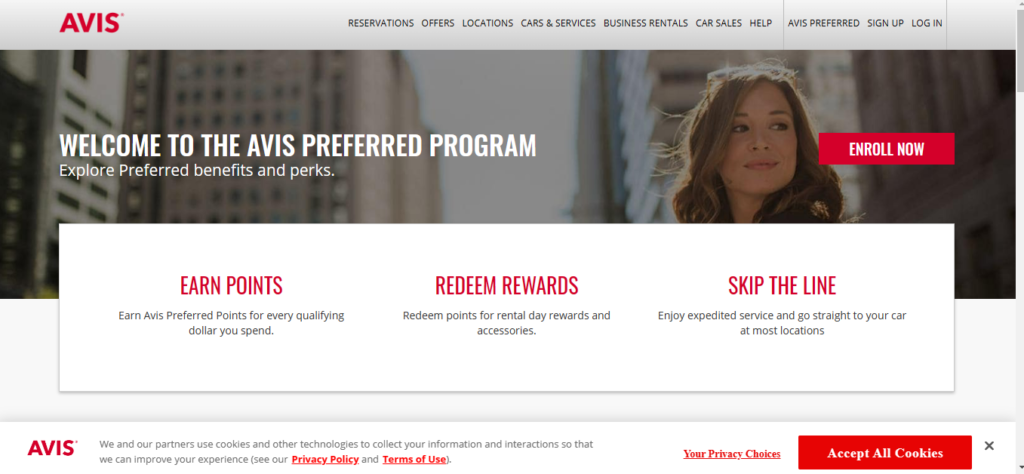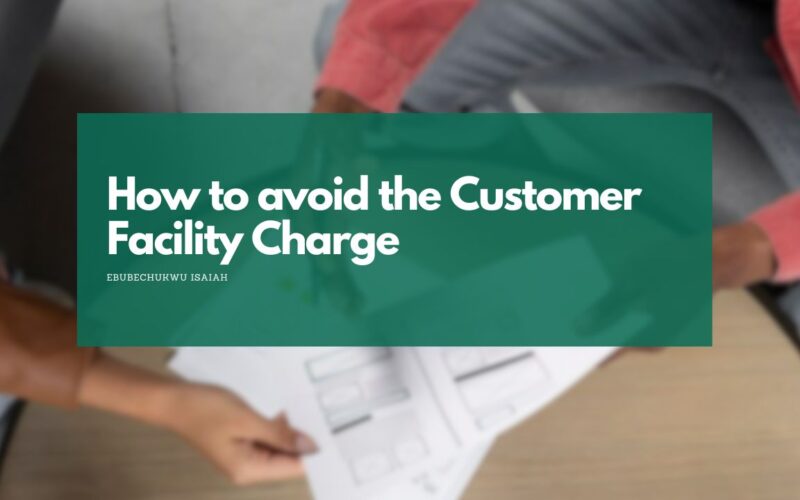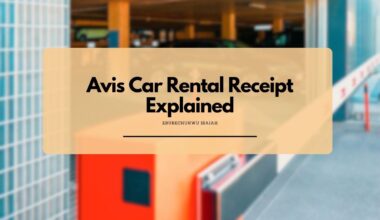As an Amazon Associate, I earn a small commission from qualifying purchases. Learn more about this.
When it comes to renting a car, what you see isn’t always what you get.
Beyond the base rental price are a slew of additional charges, including taxes, insurance, and something called a “Customer Facility Charge.”
If you’ve ever scanned through your bill from car rental companies like Avis or Budget and wondered what this charge is all about, you’re in the right place.
In this post, we’ll explain basically what the Customer Facility Charge, as well as the possibility of avoiding them.
What is the Customer Facility Charge at Avis?
If you’ve ever rented a car, chances are you’ve seen a line on your final bill for a “Customer Facility Charge” or “CFC.” This is a fee that many car rental companies—including big names like Avis and Budget—add to the cost of your rental. But what exactly is it for?

The Customer Facility Charge is essentially a fee that’s passed onto you, the renter, from the car rental company to cover the costs associated with using airport or other facility services.
This can include the maintenance of the pick-up and drop-off areas, shuttles to and from terminals, and the like.
The rental agencies themselves are typically required to pay these fees to the airports or other facilities where they operate, and they, in turn, pass these costs onto the customer.
Now, the specifics can vary depending on the location and the car rental company you’re dealing with.
In some places, the charge is mandated by the local or state government to fund transportation infrastructure improvements similar to the concession recovery fee we talked about previously.
That means the fee isn’t just a way for rental companies to make extra money; it’s a regulated part of doing business in that location (It could be though;): we can’t trust car rental companies).
It’s also worth noting that the Customer Facility Charge is usually a fixed amount per day.
So whether you’re renting a compact car or a luxury SUV, this fee will remain the same.
While it’s generally not a massive sum, it can add up, especially if you’re renting a car for an extended period. It’s always a good idea to check the specifics when you’re booking to know what additional charges, like the CFC, you can expect.
Can You Avoid Paying the Customer Facility Charge?
The short answer to this question is usually, no, you can’t avoid the Customer Facility Charge (CFC) when you rent a car from an airport or other major facility.
However, that doesn’t mean you shouldn’t be informed about it or look for ways to mitigate its impact on your overall rental cost. So let’s delve into the details.
First off, it’s essential to note that the Customer Facility Charge is a regulated fee, often mandated by the local or state government.
This means that it’s not a fee that rental companies arbitrarily decide to tack on to milk a few extra dollars from you; rather, it’s a legitimate cost of doing business at certain locations, especially airports.
So, when it’s a government-mandated fee, there’s not much room for negotiation there.
But there are some strategies you might consider to lower your overall expenses, even if you can’t eliminate the CFC entirely.
For instance, you may find that renting a car from a location that’s not part of an airport or another major facility may not include a Customer Facility Charge.
Sure, you’d need to find alternative transportation to get to this off-site rental location, but depending on the other factors like the length of your rental and the rates at that specific location, you could end up saving money overall.
Another aspect to consider is the length of your rental period.
Since the CFC is a daily charge, the cost can add up if you’re renting a car for an extended period.
If you only need a car for a day or two but are staying in a location for longer, consider renting only for the days you truly need a vehicle. Use public transportation, rideshare services, or other alternatives on the days you don’t.
Also, some memberships or corporate partnerships may offer discounted rates that could offset the impact of the CFC on your total bill.

If you’re a frequent traveler, it might be worth checking out loyalty programs from rental companies that offer such perks. While these won’t eliminate the CFC, they could make it less of a financial burden.
Is the Customer Facility Charge the Same Everywhere? and Can you Calculate
The quick answer? No, it’s not.
And this is where things can get a bit complicated, but stay with me. Understanding the variables can help you with the information you need to avoid any unexpected costs when renting a car.
Let’s start with location.
The CFC can vary depending on where you’re renting.
If you’re at a major international airport, for example, the fee could be higher compared to a smaller regional airport or a non-airport rental location.
And within the United States, the charge can differ from state to state or even city to city due to different local regulations and the specific costs of operating at a given location. Sometimes these fees are set by the local government to fund transportation projects or other public services.
Now, you might be saying, “Okay, but how do I calculate this into my budget?”
Good question.
When you book a car rental, many companies provide a detailed breakdown of all charges, including the CFC, in your reservation quote.
So, that’s one way to know what you’ll be charged.
But it’s also a smart idea to directly ask the company about all the fees involved—sometimes, not all charges are transparently listed online.
If you’re not booking in advance and are planning to walk in and rent, you can ask the customer service representative for a full breakdown of all costs.
Always get this in writing, so you’re not hit with any surprises later.
If you’re speaking with a representative on the phone, take notes, and don’t hesitate to ask for clarifications. Knowing the exact cost breakdown can help you make a more informed decision and perhaps even compare rates effectively from one rental location to another.
Conclusion
While avoiding the Customer Facility Charge entirely is often not an option, understanding what it is and considering it in your budgeting can help you make more informed decisions. And with a bit of planning, you might find ways to offset its impact.







